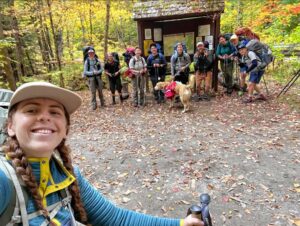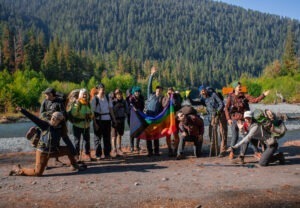Affinity spaces for queer people are essential, to share the things we carry. To meet friends, trade craft and clothing, talk about our lives, how to find doctors and well-sewn binders, how to come out, change a tire, ask for a raise, or cook for a polycule. Ana Seiler says, “whatever you’re carrying, come to The Venture Out Project.” Queer people can solve problems of all sizes together around a bonfire — with s’mores!
The Venture Out Project (TVOP) was founded in 2014 to lead a few annual backpacking trips for queer and trans people. In 2024, it’s grown into a nationally recognized nonprofit supporting LGBTQIA2S+ community building and challenge-based personal development outdoors. Founder Perry Cohen said about diverse people, “we have always been in the outdoors, you just haven’t known it.”
In interviewing TVOP’s Director of Marketing and Partnerships Ana Seiler, who is also an instructor, it’s clear the organization’s work is intentional and conscientious at every level. Seiler says their mission furthers activism already being done in the Connecticut River Valley around farming and land stewardship, food justice, sharing backcountry knowledge, and working collaboratively. How do you find food in the woods? How do you use a compass? Build a fire? Clean your water? Treat wounds? TVOP shows queer people how empowering it is to take care of themselves and develop as a community member, and how doing so collectively builds resilience within the LGBTQIA2S+ community.
Just like in queer spaces, language is important in the outdoors. “Frontcountry” refers to developed, well-used outdoor spaces easily accessible by vehicle. “Backcountry” is undeveloped, unpaved, and natural areas “seemingly” untouched by humans. Words like “developed” and “untouched” draw up ideas of colonialism and manifest destiny. TVOP’s work aims to be aware of and, forgive the pun, unpack these concepts by practicing collectivism and opposing rugged individualism.
TVOP uses a challenge-based curriculum on their trips. A “challenge” means something different to every body and every person. Their instructors are trained to support people in the process of identifying what is comfortable, uncomfortable, and most challenging about being outdoors in a facilitated environment. Maybe it’s being dirty for a few hours or days, or relieving yourself in the woods. Attendees build resilience within their own challenges, and in relationship to people trekking with them who are facing their own.
There are lots of reasons for queer and trans people to get outdoors, rooted in social justice, in joy, and where they meet. The work you do in the world and within yourself are both catalysts for positive change.
Historically, queer culture and connection has been forced to society’s edges, underground, and often, for those with the ability and privilege to access it, narrowed to building community through nightlife. In response, TVOP offers programs for adults, youth, and families out in the sunshine, and many that are substance-free. Seiler says being outdoors together levels the playing field in a way other queer gathering spaces can’t, and that “the power of choice is one of the great equalizers with the cis heteronormative community.”
TVOP’s nationwide volunteers (including some in the Connecticut River Valley!) host everything from bike rides to get ice cream, queer birding, rock climbing, and forest bathing. Additionally, TVOP leads overnight adventures in New England and beyond; substance-free white water rafting in Utah, backpacking for fat-identifying LGBTQ+ people in the Pacific Northwest, and all-experience-level bikepacking in western Mass, just to name a few. Their base camp in southern Vermont, which utilizes solar batteries and charging stations for electric vehicles, is still growing to meet its full potential.

The Venture Out Project’s Ana Seiler smiles for a selfie with nine queer backpackers and one dog all dressed for a backcountry trip standing behind her in the autumn leaves. PHOTO COURTESY THE VENTURE OUT PROJECT
Seiler was on an advanced backpacking trip in Olympic National Park last summer, traveling 30 miles in four days with instructors and backpackers ages 24 to 74. But the “advanced” label doesn’t mean you shouldn’t sign up! “Some people have never backpacked before but travel very quickly. While others may have backpacked their entire lives but move at a slower pace. That’s woven into the structure of our programs; setting group norms with all of these skill levels and bodies in mind.”
TVOP’s events are distinctively intergenerational. Part of this success, Seiler says, is designing group-minded programs with everyone’s needs in mind, including queer elders. The word “elders” here refers to queer people aged 40+, because systemic stressors and barriers to healthcare mean LGBTQ+ adults are less likely to experience old age.
Queer people find common ground in the backcountry that bypasses communication obstacles they may encounter in the frontcountry. Different generations have the chance to shatter internalized expectations of each other, and young queer people can meet their queer elders — perhaps for the first time.
The queer community is not homogenous, though many fight for equity, safety, representation and liberation. In TVOP’s programs, queer people have found they do not need to prove themselves to each other. Instead, they claim space together outdoors and learn interdependence. “We’re also busy doing hard stuff,” Seiler reminds me. “Moving as a group at the same pace, with the goal to get to camp before sunset, feed ourselves, set up tents, carry each other’s food and water — that’s hard.”
TVOP invites you to join their trips to engage your curiosity and take part in something powerful. When you show up for your first event, like a queer backcountry overnight, you’ll pull onto a property founded by and for queer and trans people. Instructors will welcome you warmly, and begin the pre-trip bonfire where you’ll meet your trail mates and set intentions over s’mores. After a frontcountry breakfast, you’ll hit the trail and learn how to backpack, to traverse a mountain in a way that protects your body, to pitch and share a tent, and more. Trips may also include spontaneous harmonica solos, Mary Oliver poems read over dinner, and stretches of quiet reflection. You’ll come out the other side knowing more about what you’re capable of, especially in community.





